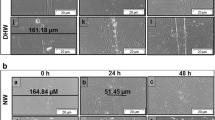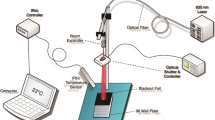Abstract
Phototherapy stimulates metabolic processes in healing wounds. Despite worldwide interest, phototherapy is not firmly established or practiced in South Africa. This study aimed to determine which dose and wavelength would better induce healing in vitro. Diabetic-induced wounded fibroblasts were irradiated with 5 or 16 J/cm2 at 632.8, 830, or 1,064 nm. Cellular morphology, viability (Trypan blue and apoptosis), and proliferation (basic fibroblast growth factor) were then determined. Cells irradiated with 5 J/cm2 at 632.8 nm showed complete wound closure and an increase in viability and basic fibroblast growth factor (bFGF) expression. Cells irradiated at 830 nm showed incomplete wound closure and an increase in bFGF expression. Cells irradiated at 1,064 nm showed incomplete closure and increased apoptosis. All cells irradiated with 16 J/cm2 at all three wavelengths showed incomplete wound closure, increased apoptosis, and decreased bFGF expression. This study showed that diabetic-wounded cells respond in a dose- and a wavelength-dependent manner to laser light. Cells responded the best when irradiated with a fluence of 5 J/cm2 at a wavelength of 632.8 nm.




Similar content being viewed by others
References
Moshkovska T, Mayberry J (2004) It is time to test low level laser therapy in Great Britain. Post Grad Med J 81(957):436–441
Basford JR (1995) Low intensity laser therapy: still not an established clinical tool. Lasers Surg Med 16(4):33–342
Cabrero MV, Failde JMG, Mayordomo OM (1985) Laser therapy as a regenerator for healing wound tissues. In: International congress on lasers in medicine and surgery. June 27–28 pp 187–192
Harris DM (1988) Laser biostimulation: review and hypothesis. Laser Topics 10:9–14
Schindl A, Schindl M, Pernerstorfer-Schon H, Schindl L (2000) Low-intensity laser therapy: a review. J Investig Med 48(5):312–326
Karu TI (1991) Low intensity laser light action upon fibroblasts and lymphocytes. In: Ohshiro T, Calderhead RG (eds) Progress in laser therapy. Selected papers from the October 1990 ILTA congress. Wiley, West Sussex, England, pp 175–179
Almeida-Lopes L, Rigau J, Zangaro RA, Guidugli-Neto J, Jaeger MM (2001) Comparison of the low level laser therapy effects on cultured human gingival fibroblasts proliferation using different irradiance and same fluence. Lasers Surg Med 29(2):179–184
Abergel RP, Meeker CA, Lam TS, Dwyer RM, Lesavoy MA, Uitto J (1984) Control of connective tissue metabolism by lasers: recent development and future prospects. Am J Acad Dermatol 11(6):1142–1150
Lubart R, Friedmann H, Peled I, Grossmann N (1993) Light effect on fibroblast proliferation. Laser Ther 5:55–57
Bolton P, Young S, Dyson M (1995) The direct effect of 860 nm light on cell proliferation and on succinic dehydrogenase activity of human fibroblasts in vitro. Laser Ther 7:55–60
Kreisler M, Christoffers AB, Willershausen B, d’Hoedt B (2003) Effect of low-level GaAIAs laser irradiation on the proliferation rate of human periodontal ligament fibroblasts: an in vitro study. J Clin Periodontal 30:35–358
Khadra M, Lyngstadaas SP, Haanaes HR, Mustafa K (2005) Determining optimal dose of laser therapy for attachment and proliferation of human oral fibroblasts cultured on titanium implant material. J Biomed Mater Res 73A(1):5–62
Tominaga R (1990) Effects of He-Ne laser irradiation on fibroblasts derived from scar tissue of rat palatal mucosa. Kokubyo Gakkai Zasshi 57:58–594
Walsh LJ (1997) The current status of low level laser therapy in dentistry. Part 1. Soft tissue applications. Aust Dent J 42(4):247–254
Yu W, Naim JO, Lanzafame RJ (1994) The effect of laser irradiation on the release of bFGF from 3T3 fibroblasts. Photochem Photobiol 59:167–170
Pourreau-Schneider N, Ahmed A, Soudry M, Jacquemier J, Kopp F, Franquin JC, Martin PM (1990) Helium-neon laser treatment transforms fibroblasts into myofibroblasts. Am J Pathol 137:171–178
Medrado AR, Pugliese LS, Reis SR, Andrade ZA (2003) Influence of low level laser therapy on wound healing and its biological action upon myofibroblasts. Lasers Surg Med 32(3):239–244
Pearl SH, Kanat IO (1988) Diabetes and healing: a review of the literature. J Foot Surg 27(3):268–270
Yu W, Naim JO, Lanzafame RJ (1997) Effects of photostimulation on wound healing in diabetic mice, Lasers Surg Med 20(1):56–63
Stadler I, Lanzafame RJ, Evans R, Narayan V, Dailey B, Beuhner N, Naim JO (2001) 830-nm Irradiation increases the wound tensile strength in a diabetic murine model. Lasers Surg Med 28(3):220–226
Reddy GK, Stehno-Bittel L, Enwemeka CS (2001) Laser photostimulation accelerates wound healing in diabetic rats. Wound Repair Regen 9(3):248–255
Reddy GK (2003) Comparison of the photostimulatory effects of visible He-Ne and infrared Ga-As lasers on healing impaired diabetic rat wounds. Lasers Surg Med 33(5):344–351
Rabelo SB, Villaverde AG, Salgado MA, Melo MD, Nicolau RA, Pacheco MT (2004) The effect of low-intensity laser therapy on wound healing in Streptozotocin-induced diabetic rats. Proc SPIE 5622:29–34
Byrnes KR, Barna L, Chenault VM, Waynant RW, Ilev IK, Longo L, Miracco C, Johnson B, Anders JJ (2004) Photomodulation improves cutaneous wound healing in an animal model of type II diabetes. Photomed Laser Surg 22(4):281–290
Maiya GA, Kumar P, Rao L (2005) Effect of low intensity helium-neon (He-Ne) laser irradiation on diabetic wound healing dynamics. Photomed Laser Surg 23(3):187–190
Khurshudian AG (1989) Use of helium-cadmium lasers in the complex treatment of suppurative diseases in patients with diabetes mellitus. Khirurgiia (Mosk) 6:38–42
Grigor’ev IV, Rakita DR, Garmash VIa (1991) Effect of endovascular laser irradiation of the blood of patients with diabetic angiopathies. Probl Endokrinol 37(6):28–30
Schindl A, Schindl M, Schon H, Knobler R, Havelec L, Schindl L (1998) Low-intensity laser irradiation improves skin circulation in patients with diabetic microangiopathy. Diabetes Care 21(4):580–584
Schindl A, Schindl M, Pernerstorfer-Schon H, Kerschan K, Knobler R, Schindl L (1999) Diabetic neuropathic foot ulcer: successful treatment by low-intensity laser therapy. Dermatology 198(3):314-316
Schindl A, Heinze G, Schindl M, Pernerstorfer-Schon H, Schindl L (2002) Systemic effects of low-intensity laser irradiation on skin microcirculation in patients with diabetic microangiopathy. Microvasc Res 64(2):240–246
Kuliev RA, Babaev RF (1991) Therapeutic action of laser irradiation and immunomodulators in purulent injuries of the soft tissues in diabetic patients. Probl Endokrinol 37(6):31–32
Hawkins D, Abrahamse H (2005) Biological effects of helium-neon laser irradiation on normal and wounded human skin fibroblasts. Photomed Laser Surg 23(3):251–259
Hawkins D, Abrahamse H (2006) The role of laser fluence in cell viability, proliferation and membrane integrity of wounded human skin fibroblasts following helium-neon laser irradiation. Lasers Surg Med 38:74–83
Rigau J, Sun C, Trelles MA, Berns M (1995) Effects of the 633nm laser on the behavior and morphology of primary fibroblasts in culture. In: Karu T, Young A (eds) Effects of low power light on biological systems. Progress in Biomedical Optics, Barcelona, Spain, pp 38–42
Hamuro M, Polan J, Natarajan M, Mohan S (2002) High glucose induced nuclear factor kappa B mediated inhibition of endothelial cell migration. Atherosclerosis 162(2):277–287
Vinck EM, Cagnie BJ, Cornelissen MJ, Declercq HA, Cambier DC (2005) Green light emitting diode irradiation enhances fibroblast growth impaired by high glucose level. Photomed Laser Surg 23(2):167–171
Abrahamse H, Hawkins D, Houreld N (2006) Effect of wavelength and fluence on morphology, cellular and genetic integrity of diabetic wounded human skin fibroblasts. Proc SPIE 6140:41–53
McDermott AM, Kern TS, Murphy CJ (1998) The effect of elevated extracellular glucose on migration, adhesion and proliferation of SV40 transformed ` cells. Curr Eye Res 17(9):924–932
Wu Q, Wang JH, Fennessy F, Redmond HP, Bouchier-Hayes D (1999) Taurine prevents high-glucose-induced human vascular endothelial cell apoptosis. Am J Physiol Cell Physiol 277(6):C1229–C1238
Ho FM, Liu SH, Liau CS, Huang J, Lin-Shiau SY (2000) High glucose-induced apoptosis in human endothelial cells is mediated by sequential activations of c-Jun NH2-terminal kinase and caspase-3. Circulation 101:2618–2624
Baumgartner-Parzer SM, Wagner L, Pettermann M, Grillari J, Gessl A, Waldhausl W (1995) High-glucose-triggered apoptosis in cultured endothelial cells. Diabetes 44(11):1323–1327
Susztak K, Raff AC, Schiffer M, Bottinger EP (2006) Glucose-induced reactive oxygen species cause apoptosis of podocytes and podocyte depletion at the onset of diabetic neuropathy. Diabetes 55(1):225–233
Vincent AM, McLean LL, Backus C, Feldman EL (2005) Short-term hypoglycemia produces oxidative damage and apoptosis in nerves. FASEB J 19(6):638–640
Carnevalli CM, Soares CP, Zangaro RA, Pinheiro AL, Silva NS (2003) Laser light prevents apoptosis in Cho K-1 cell line. J Clin Laser Med Surg 21(4):193–196
Wang F, Chen TS, Xing D, Wang JJ, Wu YX (2005) Measuring dynamics of caspase-3 activity in living cells using FRET technique during apoptosis induced by high fluence low-power laser irradiation. Lasers Surg Med 36(1):2–7
Lowe AS, Walker MD, O’Byrne M, Baxter GD, Hirst DG (1999) Effect of low intensity monochromatic light therapy (890 nm) on a radiation-impaired, wound-healing model in murine skin. Lasers Surg Med 25(4):283–284
Kana JS, Hutschenreiter G, Haina D, Waidelich W (1981) Effect of low-power density laser radiation on healing of open skin wounds in rats. Arch Surg 116(3):293–296
Van Breugel HH, Bar PR (1992) Power density and exposure time of He-Ne laser irradiation are more important than total energy dose in photo-biomodulation of human fibroblasts in vitro. Lasers Surg Med 12(5):528–537
Acknowledgments
The National Laser Center (NLC; contract grant sponsor, research grant), South Africa; National Research Foundation (NRF), South Africa; Medical Research Council (MRC), South Africa and the University of Johannesburg Research Council (URC; contract grant sponsor, research grant) supported this research. Lasers were supplied by the NLC.
Author information
Authors and Affiliations
Corresponding author
Rights and permissions
About this article
Cite this article
Houreld, N.N., Abrahamse, H. Laser light influences cellular viability and proliferation in diabetic-wounded fibroblast cells in a dose- and wavelength-dependent manner. Lasers Med Sci 23, 11–18 (2008). https://doi.org/10.1007/s10103-007-0445-y
Received:
Accepted:
Published:
Issue Date:
DOI: https://doi.org/10.1007/s10103-007-0445-y




